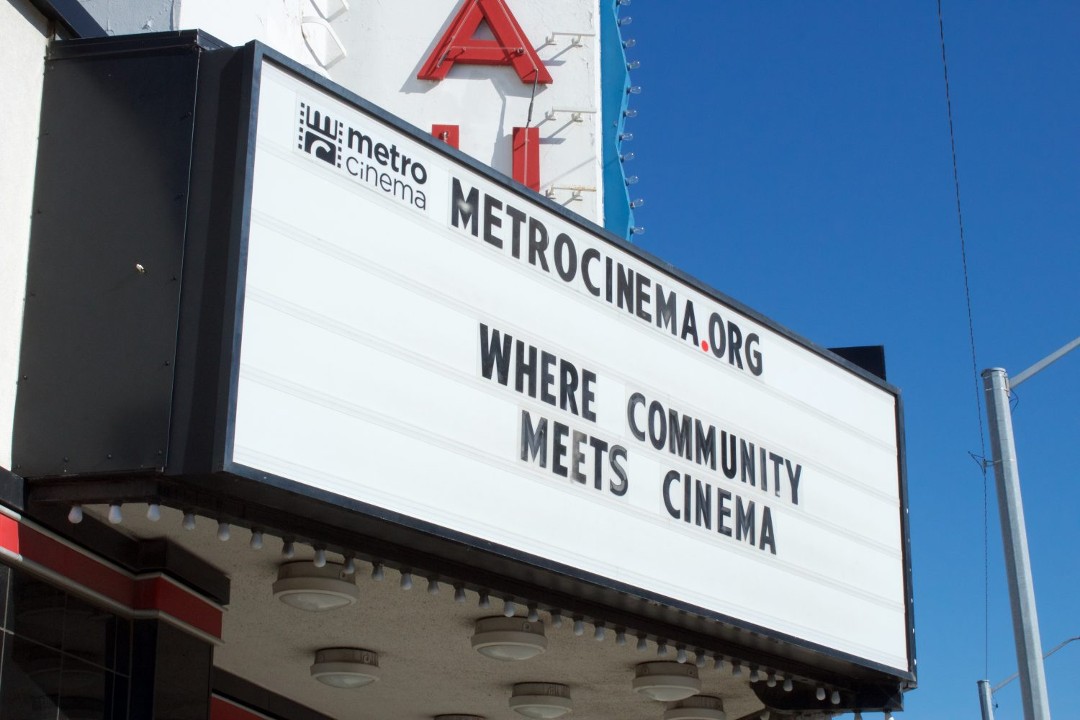As Metro Cinema opens its annual call for community programming applications, the non-profit society expects to review roughly 70 proposals and commission up to 15 community-produced series and events — all to reach more people.
"It's written into our mandate that we are a community-based, not-for-profit society," Heather Noel, Metro's programming manager, told Taproot. "So we take that word 'community' really seriously. We want Edmonton as a city involved in deciding what we screen."
Sometimes guest-programmed series at Metro are so popular they become regulars. Nicole Boychuk, who writes about film, art, the occult, and culture on Substack, has organized Not Your Final Girl for the past three years. It explores feminism within horror and genre cinema. Reel Family Cinema, family-friendly films screened for free for children 12 and younger, began as a guest-programmed series. It is now part of Metro's regular calendar.
Submissions can be for one-off events, but Noel said the majority of successful proposals run for a month. This gives the programming team an "anchor" to centre other selections around. The online form includes fields for everything from basic contact details to more thoughtful prompts about a target audience, marketing ideas, and whether there's an option to add components like guest speakers.
Noel said applicants should give thought to answering the questions asked. "I think sometimes people rush the application because they're really excited about the movies they want to screen," she said. "What we're looking for is a way to give depth to the experience. So it's not just seeing a movie, but seeing it and understanding it within a greater context of film or its connections to real-world events, or communities, or whatnot."
Noel began as a volunteer with Metro's programming committee in 2014. She became the full-time programming manager in 2021. The role follows her experience co-owning Alternative Video Spot, which later became The Videodrome (now closed). She then spent seven-and-a-half years at The Film and Video Arts Society, better known as FAVA.
"It's my job to know a lot about the diversity of film, but there's just such a richness to what we can present when we're giving other people, who might have specific niche expertise, or who are connected to different community groups, a space to present films," Noel said. "Films that maybe aren't on our radar, or they are on our radar, but we haven't found a way to prioritize putting them into our programming. I think that helps us."

Metro Cinema's community programming applications are open until April 30. The not-for-profit's team will whittle down submissions by Aug. 15. (Supplied)
It's not just about how the program benefits Metro or its home at the Garneau Theatre. Noel said community programming works with a spirit of reciprocity.
"It goes both ways. It's a way we can bring all of these different interest groups and community members together," she said. "We really recognize that it's a huge platform to have — a big screen in front of 500 seats. When we partner with either an individual or an organization and their guest programming, that's giving them an opportunity to get a certain message across, if that's what they're trying to do."
There is no hard boundary when it comes to content, Noel said. However, particularly sensitive or upsetting works proposed for screenings receive a greater degree of scrutiny. Though it boils down to the context it's being presented in, Metro would more likely take the risk and responsibility of presenting this content on its own.
"We would require greater contextualization," Noel said. "When we're getting these applications, we do ask for a bio from the applicant, but we don't know very much about who you are. We have had applications where we felt that we weren't confident that it would be best handled by a guest programmer. So with some content, it's something that we might consider doing on our own at some point with careful consideration."
There are many reasons why submissions don't get picked. For starters, it's a matter of volume. The programming team also looks at submissions holistically. It doesn't make sense to have two martial arts series in a calendar year, for example, and there is sometimes overlap in specific film choices even if they are presented in different contexts. Films submitted by their makers are not eligible for consideration (though Metro will accept these proposals separate from this program), nor are series intended to be ongoing or recurring.
"Sometimes people are proposing things that are absolutely great, and there's a logistical issue," Noel said. "Sometimes the movies that they're looking for are just not available to screen, especially if they were initially made for TV or something and the rights were never negotiated for theatrical screenings."
Guest programming can also evolve between submission and realization. If a certain film isn't available, Noel will bring suggestions back to the guest and prompt them to come up with their own alternatives.
"I'm really handling the logistics, the scheduling, the communications with distributors, and (the guest programmer is) the creative force behind it," Noel said.
Not all guest-programmed films are feature length. While Noel cited budgetary constraints as a limit to how many short films Metro can book, she said they are not out of the question. Last March's Film Florale by Elisabeth Belliveau and Anna Hawkins included both features and shorts.
Metro's community programming applications are open until April 30, and Metro will notify successful applicants by Aug. 15. This round of guest-programmed screenings takes place from October to September 2025. Guest programming is a volunteer role and submissions do not include a fee.
February marks the return of Slowed Down Sundays, guest programmed by Thomas Wishloff, a writer for online film publication In The Seats. Each Sunday, he's showcasing a film from the slow cinema arthouse movement.
